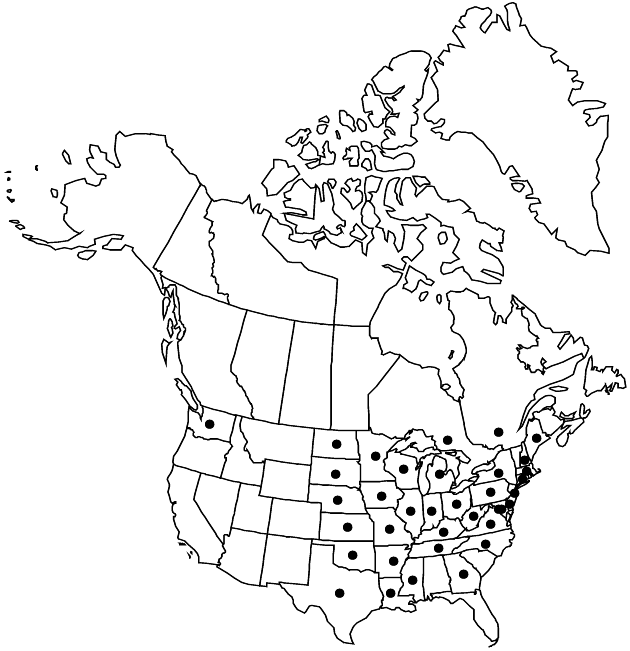Difference between revisions of "Helianthus grosseserratus"
Index Seminum (Louvain) 1839: unpaged. 1839.
FNA>Volume Importer |
imported>Volume Importer |
||
| (6 intermediate revisions by 2 users not shown) | |||
| Line 8: | Line 8: | ||
}} | }} | ||
|common_names=Sawtooth sunflower;hélianthe à grosses dents | |common_names=Sawtooth sunflower;hélianthe à grosses dents | ||
| + | |special_status={{Treatment/ID/Special_status | ||
| + | |code=E | ||
| + | |label=Endemic | ||
| + | }} | ||
|basionyms= | |basionyms= | ||
|synonyms={{Treatment/ID/Synonym | |synonyms={{Treatment/ID/Synonym | ||
|name=Helianthus instabilis | |name=Helianthus instabilis | ||
|authority=E. Watson | |authority=E. Watson | ||
| + | |rank=species | ||
}} | }} | ||
|hierarchy=Asteraceae;Asteraceae tribe Heliantheae;Asteraceae (tribe Heliantheae) subtribe Helianthinae;Helianthus;Helianthus grosseserratus | |hierarchy=Asteraceae;Asteraceae tribe Heliantheae;Asteraceae (tribe Heliantheae) subtribe Helianthinae;Helianthus;Helianthus grosseserratus | ||
| Line 27: | Line 32: | ||
|elevation=10–300+ m | |elevation=10–300+ m | ||
|distribution=Ont.;Que.;Ark.;Conn.;Del.;D.C.;Ga.;Ill.;Ind.;Iowa;Kans.;Ky.;La.;Maine;Md.;Mass.;Mich.;Minn.;Miss.;Mo.;Nebr.;N.H.;N.J.;N.Y.;N.C.;N.Dak.;Ohio;Okla.;Pa.;S.Dak.;Tenn.;Tex.;Va.;Wash.;W.Va.;Wis. | |distribution=Ont.;Que.;Ark.;Conn.;Del.;D.C.;Ga.;Ill.;Ind.;Iowa;Kans.;Ky.;La.;Maine;Md.;Mass.;Mich.;Minn.;Miss.;Mo.;Nebr.;N.H.;N.J.;N.Y.;N.C.;N.Dak.;Ohio;Okla.;Pa.;S.Dak.;Tenn.;Tex.;Va.;Wash.;W.Va.;Wis. | ||
| − | |discussion=<p>Helianthus grosseserratus is native to midwestern North America and has spread as a roadside weed into other areas, such as New England and the southeastern United States. It is introduced in Canada. Hybrids between H. maximiliani and H. grosseserratus are known as H. ×intermedius R. W. Long (R. W. Long 1954; Long 1966). Hybrids of H. grosseserratus with H. salicifolius have been described as H. kellermannii Britton (Long 1955), and those with H. mollis as H. brevifolius E. Watson (R. C. Jackson and A. T. Guard 1957b).</p> | + | |discussion=<p><i>Helianthus grosseserratus</i> is native to midwestern North America and has spread as a roadside weed into other areas, such as New England and the southeastern United States. It is introduced in Canada. Hybrids between <i>H. maximiliani</i> and <i>H. grosseserratus</i> are known as H. ×intermedius R. W. Long (R. W. Long 1954; Long 1966). Hybrids of <i>H. grosseserratus</i> with <i>H. salicifolius</i> have been described as H. kellermannii Britton (Long 1955), and those with <i>H. mollis</i> as H. brevifolius E. Watson (R. C. Jackson and A. T. Guard 1957b).</p> |
|tables= | |tables= | ||
|references= | |references= | ||
| Line 36: | Line 41: | ||
-->{{#Taxon: | -->{{#Taxon: | ||
name=Helianthus grosseserratus | name=Helianthus grosseserratus | ||
| − | |||
|authority=M. Martens | |authority=M. Martens | ||
|rank=species | |rank=species | ||
| Line 50: | Line 54: | ||
|publication title=Index Seminum (Louvain) | |publication title=Index Seminum (Louvain) | ||
|publication year=1839 | |publication year=1839 | ||
| − | |special status= | + | |special status=Endemic |
| − | |source xml=https:// | + | |source xml=https://bitbucket.org/aafc-mbb/fna-data-curation/src/2e0870ddd59836b60bcf96646a41e87ea5a5943a/coarse_grained_fna_xml/V19-20-21/V21_399.xml |
|tribe=Asteraceae tribe Heliantheae | |tribe=Asteraceae tribe Heliantheae | ||
|subtribe=Asteraceae (tribe Heliantheae) subtribe Helianthinae | |subtribe=Asteraceae (tribe Heliantheae) subtribe Helianthinae | ||
Latest revision as of 20:12, 5 November 2020
Perennials, 100–400(–500) cm (rhizomatous). Stems erect, glabrous proximally, distally glabrate, scabrellous, or strigillose (glaucous). Leaves cauline; opposite (proximal) or alternate; petioles (1–)2–5 cm; blades (light to dark green, 3-nerved distal to bases) lanceolate to lance-ovate, 10–32 × (1.2–)4–9 cm, bases cuneate, margins usually coarsely to shallowly serrate, rarely subentire (flat), abaxial faces puberulent to tomentulose, gland-dotted. Heads 3–15+. Peduncles 0.3–10 cm. Invo-lucres broadly hemispheric, 15–25 mm diam. Phyllaries 25–30 (loose, spreading), lance-linear, 10–14 × 1.5–2.5 mm (subequal), (margins ± ciliate) apices attenuate, abaxial faces glabrous or puberulent, not gland-dotted. Paleae 7–8 mm, entire or 3-toothed (apices acuminate, ± hairy). Ray florets 14–20; laminae 23–40 mm. Disc florets 100+; corollas 5–6 mm, lobes yellow; anthers dark brown to black, appendages yellow. Cypselae 3–4 mm, glabrate; pappi of 2 aristate scales 1.9–2.5 mm. 2n = 34.
Phenology: Flowering late summer–fall.
Habitat: Dry to wet prairies, other open sites
Elevation: 10–300+ m
Distribution

Ont., Que., Ark., Conn., Del., D.C., Ga., Ill., Ind., Iowa, Kans., Ky., La., Maine, Md., Mass., Mich., Minn., Miss., Mo., Nebr., N.H., N.J., N.Y., N.C., N.Dak., Ohio, Okla., Pa., S.Dak., Tenn., Tex., Va., Wash., W.Va., Wis.
Discussion
Helianthus grosseserratus is native to midwestern North America and has spread as a roadside weed into other areas, such as New England and the southeastern United States. It is introduced in Canada. Hybrids between H. maximiliani and H. grosseserratus are known as H. ×intermedius R. W. Long (R. W. Long 1954; Long 1966). Hybrids of H. grosseserratus with H. salicifolius have been described as H. kellermannii Britton (Long 1955), and those with H. mollis as H. brevifolius E. Watson (R. C. Jackson and A. T. Guard 1957b).
Selected References
None.